Alexander's Self-Deification
Alexander the Great (*356; r. 336-323): the Macedonian king who defeated his Persian colleague Darius III Codomannus and conquered the Achaemenid Empire. During his campaigns, Alexander visited a.o. Egypt, Babylonia, Persis, Media, Bactria, the Punjab, and the valley of the Indus. In the second half of his reign, he had to find a way to rule his newly conquered countries. Therefore, he made Babylon his capital and introduced the oriental court ceremonial, which caused great tensions with his Macedonian and Greek officers.
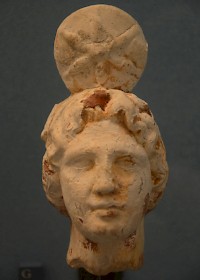
Although Alexander the Great was not the first human to receive divine honors, his self-deification set an example for Hellenistic kings, Roman emperors, and other rulers. However, this would not have been the case if Alexander’s self-deification had not been entirely rational and if it had not offered advantages that no ancient ruler could afford to ignore.
Alexander's Example: Philip
The Macedonians had wanted to attack the Achaemenid Empire since 340 BCE, but their king Philip had first decided to teach the Greeks that their defeat in the Third Sacred War (356-346) had been decisive. He acted quickly. In 338, he defeated the Athenians and Thebans at Chaeronea; in 337, he reorganized Greece in the Corinthian League; and in the spring of 336, when the Persian Empire was suffering from a civil war, his advance guard crossed the Hellespont. Several towns in Asia Minor revolted and hailed Philip, who was still in Macedonia, as their liberator.
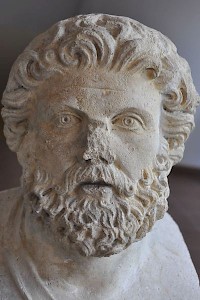
The people of Eresus (a town on the island Lesbos) erected an altar to Zeus Philippios and Ephesians placed his statue in the sanctuary of Artemis. Now that he shared a shrine with a deity - the Greek word is synnaos - Philip had been raised to a rank higher than that of a mere mortal, but even better was to come. In October 336, the Macedonian king wanted to celebrate the wedding of his daughter Cleopatra and his departure to the Persian front. Those who attended the ceremony in the theater of Aegae saw that statues of the twelve Olympian deities had been placed on the stage, and that Philip wanted to sit on a throne between them. He wanted to be the equal of the gods, isotheos.
It was not to be. Philip was murdered during the celebration (by a bodyguard, for personal reasons), and many Greeks and Macedonians must have believed that this was the fitting punishment of the blasphemer. Yet, he had set an example for Alexander, whose spectacular career was to be matched by an equally spectacular rise in the cosmic hierarchy: crown prince, king of Macedonia, king of Asia, son of Zeus, justice incarnated, avatar of Vishnu, invincible god.
King of Asia
As is well-known, Alexander invaded Asia in 334, defeated a force of satraps - Persia’s royal army force was still suppressing revolts in Babylonia and Egypt - at a small river called Granicus, and proceeded to capture towns that were, after the destruction of the Persian forces at the Granicus, undergarrisoned. After losing the strategic initiative during the time-consuming siege of Halicarnassus, the Macedonian armies united at Gordium, where they were forced to wait for the next move by their enemies: would they continue the naval offensive in the west or would they gather an army in Syria? During this pause, Alexander visited a shrine where an old chariot was standing. According to an ancient oracle, the man who was able to untie the knot with which a yoke was tied to the chariot would one day be “king of Asia”. The way Alexander solved the problem, by cutting the knot, has become proverbal.
The original, native myth behind the prediction cannot have been about kingship of Asia. “Asia” is of course not an Asian concept: the idea that there existed something called Asia originated on the shores of the Aegean Sea, where Europe and Asia are recognizable entities. And even if “Asia” would have been a concept known to the people of Gordium, what would that have meant to the Macedonians and Greeks? Was Asia the name only of the eastern shore of Aegean Sea? Was it all the land until the Euphrates? A synonym for the Persian Empire? The entire continent? No one knew, and that made the prediction perfectly suitable as propaganda. At any given moment, and no matter where the Persians decided to attack, Alexander could claim victory.
As it happened, the new Persian king, Darius III Codomannus, recalled his troops from the Aegean Sea to Syria, and Alexander marched to the southeast, where he defeated the Persian main force at Issus (November 333). The road to the Persian ports in Phoenicia lay open, and it was certain that most cities would eventually come to terms with the Macedonians. Alexander could rightfully claim to be “king of Asia”, and although his biographer Plutarch - who is not interested in chronology - states that the young Macedonian ruler accepted this title only after his victory at Gaugamela, the historian Arrian is probably right that it happened immediately after Issus.
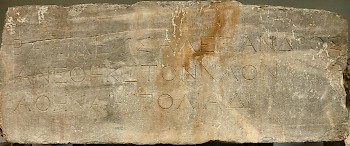
At that point, Alexander also started to use the expression basileus, “king”, in inscriptions (e.g., the foundation inscription of the temple of Athena Polias in Priene). Anyhow, it was after a military victory that Alexander started to call himself “king of Asia”. It was his first step towards divinity.
Son of Zeus
After the conquest of Phoenicia, where Alexander left several garrisons, he proceeded to Egypt. His motives are not entirely clear, but control of one of the main grain suppliers of Greece was useful, because the Greek towns had not been fully pacified. However this may be, the move meant an expansion of the war and required a larger army. We read about reinforcements by contingents from several subject nations, like the Samarians, and we also read about non-Macedonian and non-Greek officials, like the Egyptian Petisis, who was left in charge of Lower Egypt. Alexander’s army and kingdom were becoming increasingly complex.
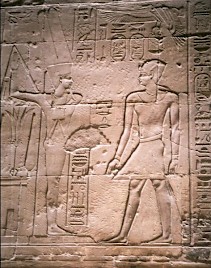
In Egypt, Alexander tried to present himself as a local ruler, for example by sacrificing to the Apis bull, a ritual that the Greeks believed to be important for the Egyptians. Among the royal titles accepted by Alexander were ancient names like “beloved by Amun” and “chosen by Ra”. The important point, however, was the common pharaonic title “son of Ra”, which might be translated as both “son of Zeus” (because Ra was Egypt’s supreme god) and “son of Helios” (because Ra was a solar deity). Both must have appealed to Alexander, who belonged to a dynasty that claimed to descend from Zeus’ son Heracles, and was somehow connected to the sun as well (see below).
The title of “son of Zeus” was immediately accepted in the Greek world. While Alexander was venturing in the western desert, where the priest of the oracle of Ammon in Siwa again saluted him as son of a god, reports about Alexander’s new title must have been carried to Greece on the last ships to cross the Mediterranean before the winter set in. When the sea was open again in the spring of 331, the first ships to arrive in Egypt brought the news that the old oracle of Didyma, which had been silent since the age of Xerxes, had spoken again, and had “unexpectedly” announced that Alexander was the son of Zeus.
It is easy to be cynical about this. To Alexander, who seriously believed to be a descendant of Heracles and Achilles, it was a fact of life that mere mortals could have divine fathers. Besides, the Macedonian soldiers were already far from home, the outcome of the war was still uncertain, and the treasuries of Susa and Persepolis still had to be captured. Accepting glorious titles was a way to inspire the men. There was more to come, because Alexander’s army became increasingly complex - the ruler cult was to be an important way to keep it united.
Sogdia
At the Euphrates, the Persian army managed to block Alexander’s march to Babylon, forcing him to make a detour along the Tigris. It was the last Persian success. At Gaugamela, the Macedonians and their allies defeated their opponents, who were demoralized by a celestial omen. Alexander captured and garrisoned Babylon and Susa, fought himself a way through the Zagros mountains, reached the Persian capital Persepolis, and sacked it. In July 330, Darius III was killed by his own satraps, and while the murderers fled to Sogdia (modern Uzbekistan), the son of Zeus faced the strategic dilemma that had been in the making for some time: if he returned home, an Iranian leader might reunite the Iranian tribes and become dangerous again (as the Parthian king Mithradates I the Great was to do in the 140s), if Alexander stayed in Iran, however, he needed more garrisons than Macedonia and Greece could send.
He chose the second course, which inevitably meant that he would have to strike a compromise with the defeated Persians: they would have to be the Macedonians’ partners. This created tensions with more conservative people in Alexander’s army. Many soldiers wanted to go back, but instead, they had to invade Sogdia - an operation that was only necessary to appease the Persians, who wanted to see the murderers of their king punished. The frustrated soldiers must have felt even worse when they learned that their commander had started to dress like a Persian king. The problems were exacerbated when the Macedonian infantry forces suffered defeats and the Iranian cavalry achieved successes.
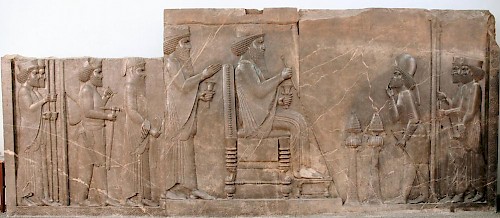
Tensions between the European and the Asian units, tensions between the Macedonian veterans and newly arrived Greek mercenaries, tensions between cavalry and infantry: more than ever, Alexander needed a unifying principle. The perfect solution was to introduce proskynesis, the Persian court ritual in which every nation and rank had a way of its own to approach the ruler.
We cannot reconstruct the details, but perhaps non-soldiers were to prostrate themselves, soldiers were to bow, and the highest (Macedonian) officers were to blow a kiss. The introduction was carefully staged and the Iranian officers saluted the new great king as they were used to, but when a courtier made a joke about what was going on, this attempt to unite court and army in one ritual came to naught. Alexander’s anger is best proven by the fact that no one in the camp ever discovered what became of the courtier.
The Iranian court ritual was so offensive because the Greeks were not used to bow - they only bowed for their gods. So, if Alexander wanted to give a sense of shared values to his army, he had to become a god.
As it happened, there was a second incident that brought Alexander to the same conclusion. During a banquet, when Alexander was drunk, he killed one of his friends. Immediately, he announced he would commit suicide, which would no doubt result in the violent disintegration of the army. Anyone agreed that this had to be avoided at all costs, and a philosopher convinced the son of Zeus that he had done nothing wrong. After all, he was a king and kings made laws, hence kings were above the law, and anything was allowed if it was done by a king, as if he were justice incarnated.
Rainmaker
After the genocidal campaign in Sogdia had ended, the Macedonians invaded the Punjab. Somewhere in the valley of the river Kabul, a group of frightened rajas came to Alexander, saying that they had heard stories about visiting gods, but had never seen a deity themselves, which was why they had come to submit themselves to Alexander. It is hard to reconstruct what lies behind this incident, but it is likely that the Indian leaders recognized the conqueror as avatar of Vishnu. However that may be, they were the first to recognize Alexander as the god he believed he needed to be.
Assuming that all of India had now surrendered, Alexander invaded the Punjab, mercilessly killing anyone who resisted. The main battle was fought in the spring of 326 against the leader of the kingdom of the Paurava, who is usually called Porus in the Greek sources. The battle was won because during a devastating rainshower, the Indian leader could not employ his main weapons: his chariots and elephants slipped away in the mud, the archers could not fix their three-meter tall bows on solid ground. Immediately after the fight, Alexander issued a new set of coins, showing himself with a lightning bolt in his hand. In other words, the official battle theology was that Alexander had caused the rain to fall, an idea that fitted perfectly in both Iranian ideas about kingship and Macedonian ideas that Alexander was the son of the cloud-gathering Zeus.
Did the soldiers believe it? Perhaps not: they refused to invade the kingdom of Magadha along the Ganges, forcing Alexander to return.
An incident during the return campaign shows how Alexander tried to deify himself: when he was in fact wounded in his sternum (as Nearchus tells us), he pretended to have a pneumothorax (as the sources have recorded). His soldiers, who knew that a pneumothorax was incurable, must have been impressed when Alexander managed to ride a horse after a surprisingly brief time. This incident also suggests that the Macedonian king himself did not believe that he was a god. It was only necessary to unify his army.
The invincible god
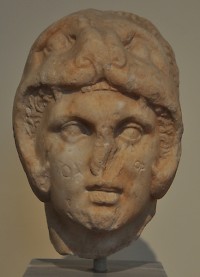
A request to sacrifice to Alexander is not attested, but there are strong indications that by the end of 324 BCE, the king received divine honors. He had already presented himself as Dionysus, and if we are to believe Ephippus (one of his courtiers), Alexander also wore the attributes of Heracles occasionally. It was an act, and he still hoped to persuade the Macedonian part of his army to join: if he pretended to be their god, they could pretend that they worshiped him, and they would have a unified army, court, and state.
The Greek towns were certainly willing to join. The Ephesians invented a nice story about Alexander’s miraculous birth and hired a famous artist to make a painting of Alexander with his lightning bolt; in Priene, the house where Alexander had once spent a couple of nights, became a temple; and in Athens, an altar was dedicated to “the invincible god”.
By 323, Alexander seemed to have achieved his aim, and it is possible to read the story about the “Opis Mutiny” not as a mutiny, but as an account of Alexander’s last victory: his own men looking for a way to accept the Iranian court ritual. We don’t know, but it is certain that kneeling and kissing were common at the court of Alexander’s successors.
Alexander died, on June 11, 323 in Babylon while preparing for a campaign to Arabia. One anecdote, recorded by Arrian, tells that the king at some stage wanted to drown himself in the Euphrates, so that his body would be lost and people would believe that he ascended to heaven. The story is of course untrue, but fits his general aims.
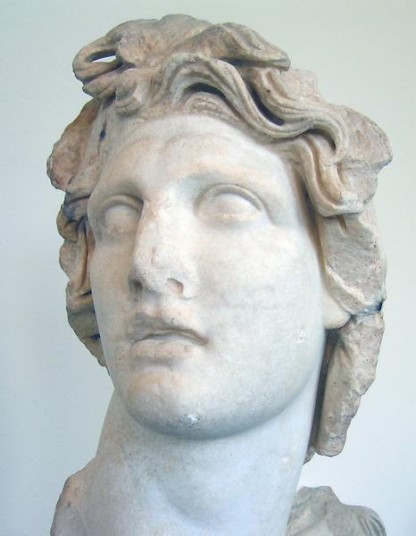
The self-deification had been a rational policy, and was repeated by his successors: the ruler cult of the Hellenistic kings and Roman emperors is well-attested. It was a strategy for anyone who had to create unity in the armies, courts, and kingdoms. But it came at a prize: during the Roman Empire, it was generally recognized that Alexander’s idea that the god-king was not subject to the law, was the equivalent of moral corruption. The man who had conquered the world, had lost his soul. It is possible that the famous remark, made by Vespasian on his death bed, that he feared becoming a god, was not a joke at all, but a serious observation about the corruptive nature of power.
Literature
This article was published in 2010 in Ancient Warfare. The importance of the events in Sogdia and India is dealt with by A.B. Bosworth in his Alexander and the East. The Tragedy of Triumph (1998). The interpretation of the coins discussed above is based on Frank Holt, Alexander the Great and the Mystery of the Elephant Medallions (2003).
Appendix: The Sun King
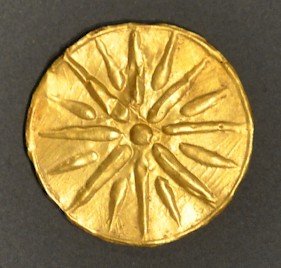
Herodotus tells an old, rationalized legend about Macedonia’s first king and his connection to the sun.note We would like to know more about it, because on many occasions, Alexander is connected to the sun as well: he compares himself to a sunnote and is upset when he faces the setting sun.note Later artists had no problems in equaling the Macedonian conqueror to Helios, and although this may be a reconsideration of the fact that Alexander, like the sun, had seen the who world, it is equally possible that the association was already in existence during Alexander’s life.
It may be noted that the closest iconographic parallel to the sixteen-pointed symbol that is now known as the “star of Vergina”, is the sun as shown on the coins of Ouranopolis, a new city, founded by Cassander’s brother Alexarchus, surnamed “the sun”.